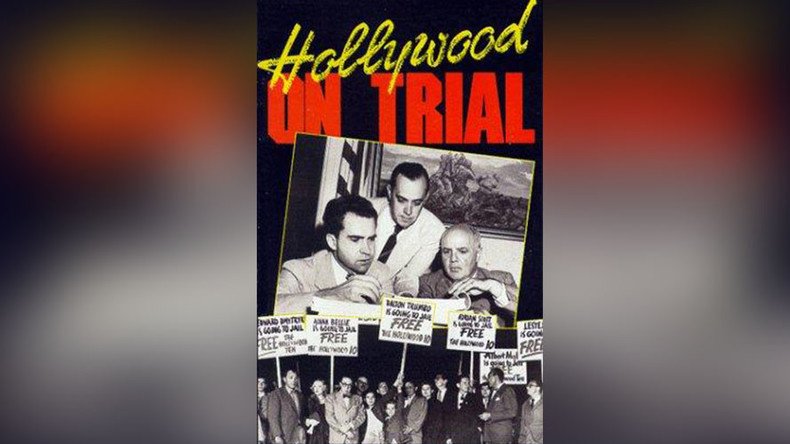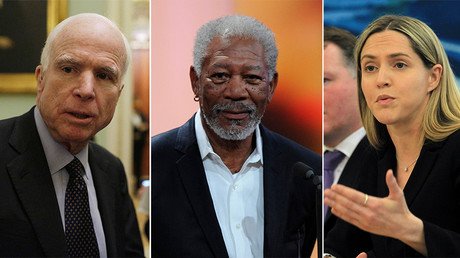Red scare 2.0: History repeats 70yrs after Hollywood witch hunts

Russia’s malign influence is everywhere and the US government has convened committees to assess the threat, subpoena witnesses and to find out the names of those responsible for plotting against American interests.
No, that’s not present day – it’s October 20, 1947, when members of the House Un-American Activities Committee (HUAAC) opened their investigation into alleged communist elements within the Hollywood film industry.
The hearings, which resulted in the imprisonment of 10 screenwriters and directors, heralded the beginning of an ugly phase in US political history when anti-Russia hysteria superseded human decency and facilitated naked self-interest.
Some 70 years on to the day, one wonders: what’s changed?
To paraphrase Karl Marx, when history repeats itself, farce naturally follows tragedy. Russophobia is once again in the ascendancy, with prominent US politicians, actors and journalists on the hunt to root out the ‘Red Menace.
When asked if they knew any communists operating in Hollywood, some high-profile witnesses named names as a matter of convenience.
Walt Disney testified that union organizer Herbert Sorrell had told him he could “make a dust bowl” out of his productions if he chose to. He also stated, rather vaguely, that he knew Sorrell was a communist because he’d seen his name “on a number of Commie front things.”
Sorrell had been a leading player in a number of strikes involving the Screen Cartoonist’s Guild throughout the 1940s – a matter of interest to the creator of Mickey Mouse.
Ronald Reagan, the then-actor whose biggest role came later in ‘Bedtime for Bonzo,’ a 1951 comedy in which he played a psychologist trying to teach “morals” to a chimpanzee, also testified that a “small clique” of communists had attempted to be a disruptive influence within the Screen Actors Guild.
'We are at war'
Today US Senator John McCain (R-Ariz) has taken on the mantle of HUAAC chairman Parnell Thomas, a Cold War veteran still raging against the perceived Russian bogeyman. The hysteria has spread to Hollywood, too.
READ MORE: Phantom menace? Liam Neeson calls for whistleblowers on alleged Trump-Russia collusion
In a video posted online last month, Morgan Freeman appeared to channel his character from the disaster movie ‘Deep Impact’ to gravely state that the US is now on a war footing. Adopting the dramatic tone of a US president announcing the asteroid-induced end of civilization, Freeman demands that the government reveal the truth about alleged Russian election hacking.
“We have been attacked,” he says in the video. “We are at war.”
Meanwhile, former British Conservative MP and journalist Louise Mensch satirizes herself. An icon among hardcore Russophobes, she tweeted an open letter to Russian President Vladimir Putin, entitled “Dear Mr. Putin, Let’s Play Chess,” back in January.
Among the piece’s many ‘highlights,’ Mensch claims to have discovered that Edward Snowden was part of a years-long Russian plot to discredit Hillary Clinton.
In March this year, the New York Times published an op-ed in which Mensch advises the US Congress how to conduct the Russian investigation. “I have some relevant experience,” she wrote.
No evidence? No problem!
The outcome of the 2016 US presidential election has driven much anti-Russian sentiment in recent times, despite the notable lack of evidence indicating any outside influence on the election.
Committees in both the House and Senate continue to call witnesses from the national security state, the Trump campaign as well as other law enforcement agencies in what appears to be a revolving door of political characters.
Earlier this month, CNN said it uncovered evidence that Russian hackers used the popular augmented reality game ‘Pokemon Go’ in an effort to inflame racial tensions in the US during the presidential election.
The search for Russian influence has gone beyond even Hollywood, with lawmakers now monitoring social media sites for signs of the supposed Red Menace. Representatives for Twitter and Facebook have been called to appear before the Senate Intelligence Committee on November 1 over claims that “Russian” advertising somehow affected the presidential election.
‘Pikachu is a Russian agent’: Meddling in US election extends to Pokemon Go, according to CNN https://t.co/0ukssELPgXpic.twitter.com/8U0Uv3mnVt
— RT (@RT_com) October 15, 2017
The bizarre, and farcical, scheme involved the supposed Russian hacking group promoting a contest encouraging Black Lives Matter activists to play the game at sites known for being scenes of police brutality.
On the anniversary of the launch of the House Un-American Activities Committee, the US media and political class ought look again at the lessons of the past.













